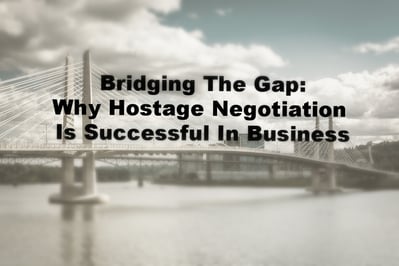 Last week, I was presenting basic negotiations concepts to a group of CEOs and senior managers. About 45 minutes into our talk, one of the participants asked if I was going to draw a correlation or otherwise explain how hostage negotiations techniques apply to the business world.
Last week, I was presenting basic negotiations concepts to a group of CEOs and senior managers. About 45 minutes into our talk, one of the participants asked if I was going to draw a correlation or otherwise explain how hostage negotiations techniques apply to the business world.
I thought I had done that during the introduction. Apparently, I fell short. I then recalled an email from a training client who asked if, during my time with them next week, I was going to bridge the gap between business and hostage negotiations. Both queries led me to pen this article.
So how can what I do, which is use communication skills to save lives, be applied to business and personal interactions? As hostage negotiators, we are trained to de-escalate emotions and return people to a normal functioning level for better decision-making and behavioral change. Human nature dictates that everything you say causes an emotional reaction in the person receiving the message. That reaction may be positive or negative. It may be mild enough to be unconscious or strong enough to cause a significant response. We have learned that negative emotions impact decision-making and by extension, behavior.
Hostage negotiation techniques are predicated on this human nature response. Once you understand the human nature response; what motivates them, what they value, their frame of reference, people become eminently more predictable. You can start to predict what they are going to do because you have a deep understanding of their worldview. Armed with this, you can increase your proficiency at influencing, gathering information, and maintaining the relationship.
Hostage negotiators and those in the business world both engage in what Daniel Pink calls “non-sales” selling. In his book, “To Sell is Human” Pink notes that one in nine work-force adults are engaged in the traditional selling of goods and services. The other eight are engaged in “non-sales” selling. In other words, they are spending up to 40% of their time at work influencing other people to move in a desired direction. That is what hostage negotiators do 100% of the time. We are compliance professionals. We sell jail time, and we get people to buy it all the time. A hostage-taker is the consummate “no” person. Not one time in my career did I call into a crisis site and say, “Hey Joe, this is Derek. I’m here to help. Why don’t you come out?” wherein, Joe replied, “Sure. I was just waiting for you to get here.” Rather, on my first call, I am subjected to insults, expletives, and threats. In other words, “no.” Hostage negotiators take the “no” person (the hostage-taker) and turn him into a “yes” person where he agrees that spending the next 20 years of his life in a penitentiary is a good idea. Who are the “no” people encountered in business? Anyone who says:
- Do this or else.
- Give me the raise, or I quit.
- Cut your price, or we are going to a competitor,
- You need to make a decision now.
- We need this by ______ or there is no deal.
Whether you are talking about contracts, mergers and acquisitions, salary negotiations, dealing with procurement people, disgruntled employees or family members, hostage negotiation skills are tested and proven in influencing and behavioral change. Good for law enforcement. Good for business.
